高教版大学英语泛读教程4(第三版)电子教案Unit 2
- 格式:pptx
- 大小:3.99 MB
- 文档页数:28
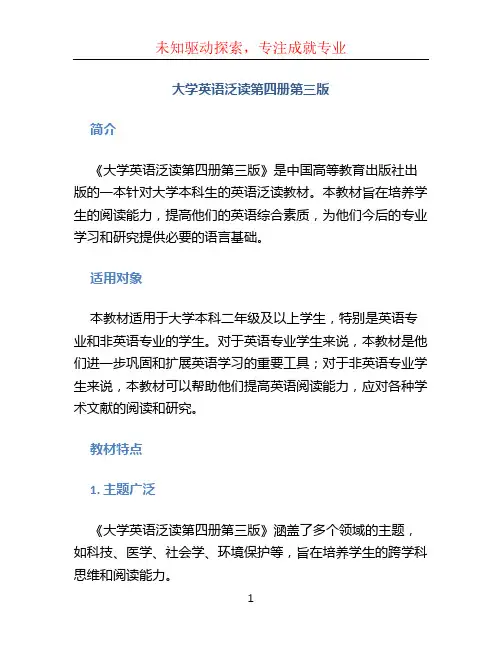
大学英语泛读第四册第三版简介《大学英语泛读第四册第三版》是中国高等教育出版社出版的一本针对大学本科生的英语泛读教材。
本教材旨在培养学生的阅读能力,提高他们的英语综合素质,为他们今后的专业学习和研究提供必要的语言基础。
适用对象本教材适用于大学本科二年级及以上学生,特别是英语专业和非英语专业的学生。
对于英语专业学生来说,本教材是他们进一步巩固和扩展英语学习的重要工具;对于非英语专业学生来说,本教材可以帮助他们提高英语阅读能力,应对各种学术文献的阅读和研究。
教材特点1. 主题广泛《大学英语泛读第四册第三版》涵盖了多个领域的主题,如科技、医学、社会学、环境保护等,旨在培养学生的跨学科思维和阅读能力。
2. 文章多样本教材选取了多种形式和风格的文章,包括新闻报道、科学论文、社论、散文等。
这样的多样性可以帮助学生熟悉不同类型的英语文本,提高他们的阅读水平和理解能力。
3. 任务指导每篇文章都配有任务指导,帮助学生在阅读过程中更好地理解文章内容。
任务指导包括预读问题、词汇翻译、主题分析等,通过这些指导,学生可以更深入地理解文章,并培养自主学习的能力。
4. 词汇与语法练习《大学英语泛读第四册第三版》还包括词汇与语法练习部分,帮助学生巩固和扩展他们在阅读过程中所学到的词汇和语法知识。
这些练习旨在让学生更深入地运用所学知识,并提高他们在写作和口语方面的语言表达能力。
使用方法1. 课堂教学教师可以根据教材提供的课堂活动和教学指导,设计相应的课堂教学方案。
在课堂上,教师可以组织学生进行小组活动、讨论和演讲,以促进学生对文章内容的理解和思考。
2. 自主学习学生可以根据教材提供的任务指导和习题进行自主学习。
在自主学习过程中,学生可以通过阅读、思考和解答问题,提高他们的阅读能力和英语综合素质。
3. 辅助工具除了教材本身,学生还可以利用网络和词典等辅助工具来扩展阅读材料和查阅生词。
这些工具可以帮助学生更全面地理解文章内容,并提高他们的词汇量和阅读速度。
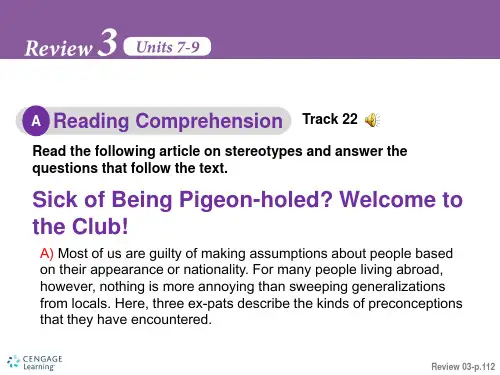
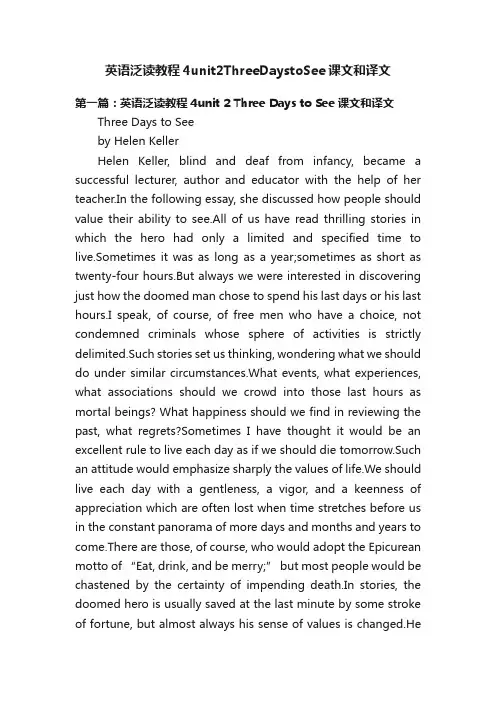
英语泛读教程4unit2ThreeDaystoSee课文和译文第一篇:英语泛读教程4unit 2 Three Days to See课文和译文Three Days to Seeby Helen KellerHelen Keller, blind and deaf from infancy, became a successful lecturer, author and educator with the help of her teacher.In the following essay, she discussed how people should value their ability to see.All of us have read thrilling stories in which the hero had only a limited and specified time to live.Sometimes it was as long as a year;sometimes as short as twenty-four hours.But always we were interested in discovering just how the doomed man chose to spend his last days or his last hours.I speak, of course, of free men who have a choice, not condemned criminals whose sphere of activities is strictly delimited.Such stories set us thinking, wondering what we should do under similar circumstances.What events, what experiences, what associations should we crowd into those last hours as mortal beings? What happiness should we find in reviewing the past, what regrets?Sometimes I have thought it would be an excellent rule to live each day as if we should die tomorrow.Such an attitude would emphasize sharply the values of life.We should live each day with a gentleness, a vigor, and a keenness of appreciation which are often lost when time stretches before us in the constant panorama of more days and months and years to come.There are those, of course, who would adopt the Epicurean motto of “Eat, drink, and be merry;” but most people would be chastened by the certainty of impending death.In stories, the doomed hero is usually saved at the last minute by some stroke of fortune, but almost always his sense of values is changed.Hebecomes more appreciative of the meaning of life and its permanent spiritual values.It has often been noted that those who live, or have lived, in the shadow of death bring a mellow sweetness to everything they do.Most of us, however, take life for granted.We know that one day we must die, but usually we picture that day as far in the future.When we are in buoyant health, death is all but unimaginable.We seldom think of it.The days stretch out in an endless vista.So we go about our petty tasks, hardly aware of our listless attitude toward life.The same lethargy, I am afraid, characterizes the use of all our faculties and senses.Only the deaf appreciate hearing, only the blind realize the manifold blessings that lie in sight.Particularly does this observation apply to those who have lost sight and hearing in adult life.But those who have never suffered impairment of sight or hearing seldom make the fullest use of these blessed faculties.Their eyes and ears take in all sights and sounds hazily, without concentration, and with little appreciation.It is the same old story of not being grateful for what we have until we lose it, of not being conscious of health until we are ill.I have often thought it would be a blessing if each human being were stricken blind and deaf for a few days at some time during his early adult life.Darkness would make him more appreciative of sight;silence would teach him the joys of sound.Now and then I have tested my seeing friends to discover what they see.Recently I was visited by a very good friend who had just returned from a long walk in the woods, and I asked her what she had observed.“Nothing in particular,” she replied.I might havebeen incredulous had I not been accustomed to such responses, for long ago I became convinced that the seeing see little.How was it possible, I asked myself, to walk for an hourthrough the woods and see nothing worthy of note? I who cannot see find hundreds of things to interest me through mere touch.I feel the delicate symmetry of a leaf.I pass my hands lovingly about the smooth skin of a silver birch, or the rough shaggy bark of a pine.In spring I touch the branches of trees hopefully in search of a bud, the first sign of awakening Nature after her winter's sleep.I feel the delightful, velvety texture of a flower, and discover its remarkable convolutions;and something of the miracle of Nature is revealed to me.Occasionally, if I am very fortunate, I place my hand gently on a small tree and feel the happy quiver of a bird in full song.I am delighted to have the cool water of a brook rush through my open fingers.To me a lush carpet of pine needles or spongy grass is more welcome than the most luxurious Persian rug.To me the pageant of seasons is a thrilling and unending drama, the action of which streams through my finger tips.At times my heart cries out with longing to see all these things.If I can get so much pleasure from mere touch, how much more beauty must be revealed by sight.Yet, those who have eyes apparently see little.The panorama of colour and action which fills the world is taken for granted.It is human, perhaps, to appreciate little that which we have and to long for that which we have not, but it is a great pity that in the world of light the gift of sight is used only as a mere convenience rather than as a means of adding fullness to life.If I were the president of a university I should establish a compulsory course in “How to Use Your Eyes”.The professor would try to show his pupils how they could add joy to their lives by really seeing what passes unnoticed before them.He would try to awake their dormant and sluggish faculties.Suppose you set your mind to work on the problem of how you would use your own eyes if you had onlythree more days to see.If with the oncoming darkness of the third night you knew that the sun would never rise for you again, how would you spend those three precious intervening days? What would you most want to let your gaze rest upon?I, naturally, should want most to see the things which have become dear to me through my years of darkness.You, too, would want to let your eyes rest long on the things that have become dear to you so that you could take the memory of them with you into the night that loomed before you.I should want to see the people whose kindness and gentleness and companionship have made my life worth living.First I should like to gaze long upon the face of my dear teacher, Mrs.Anne Sullivan Macy, who came to me when I was a child and opened the outer world to me.I should want not merely to see the outline of her face, so that I could cherish it in my memory, but to study that face and find in it the living evidence of the sympathetic tenderness and patience with which she accomplished the difficult tasks of my education.I should like to see in her eyes that strength of character which has enabled her to stand firm in the face of difficulties, and that compassion for all humanity which she has revealed to me so often.I do not know what it is to see into the heart of a friend through that “window of the soul”, the eye.I can only “see” through my finger tips the outline of a face.I can detect laughter, sorrow, and many other obvious emotions.I know my friends from the feel of their faces.But I cannot really picture their personalities by touch.I know their personalities, of course, through other means, through the thoughts they express to me, through whatever of their actions are revealed to me.But I am denied that deeper understanding of them which I am sure would come through sight of them throughwatching their reactions to various expressed thoughts and circumstances, through noting the immediate and fleeting reactions of their eyes and countenance.Friends who are near to me I know well, because through the months and years they reveal themselves to me in all their phases;but of causal friends I have only an incomplete impression, an impression gained from a handclasp, from spoken words which I take from their lips with my finger tips, or which they tap into the palm of my hand.How much easier, how much more satisfying it is for you who can see to grasp quickly the essential qualities of another person by watching the subtleties of expression, the quiver of a muscle, the flutter of a hand.But does it ever occur to you to use your sight to see into the inner nature of a friend or acquaintance? Do not most of you seeing people grasp casually the outward features of a face and let it go at that?For instance, can you describe accurately the faces of five good friends? Some of you can, but many cannot.As an experiment, I have questioned husbands of long standing about the color of their wives' eyes, and often they express embarrassed confusion and admit that they do not know.And, incidentally, it is a chronic complaint of wives that their husbands do not notice new dresses, new hats, and changes in household arrangements.The eyes of seeing persons soon become accustomed to the routine of their surroundings, and they actually see only the startling and spectacular.But even in viewing the most spectacular sights the eyes are lazy.Court records reveal every day how inaccurately “eyewitnesses” see.A given event will be “seen” in several different ways by as many witnesses.Some see more than others, but few see everything that is within the range of their vision.Oh, the things that I shouldsee if I had the power of sight for just three days!(1634 words)译文假如我有三天光明海伦·凯勒海伦·凯勒自幼就又盲又聋,在老师的帮助下成为一名成功的讲师、作家及教育家。
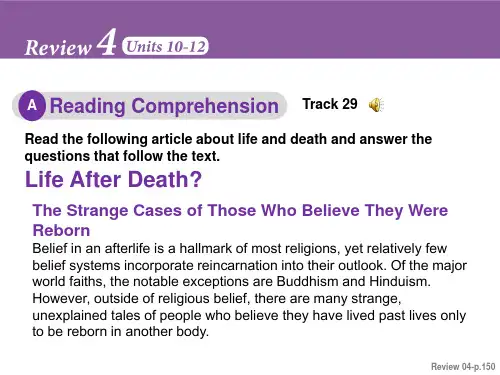
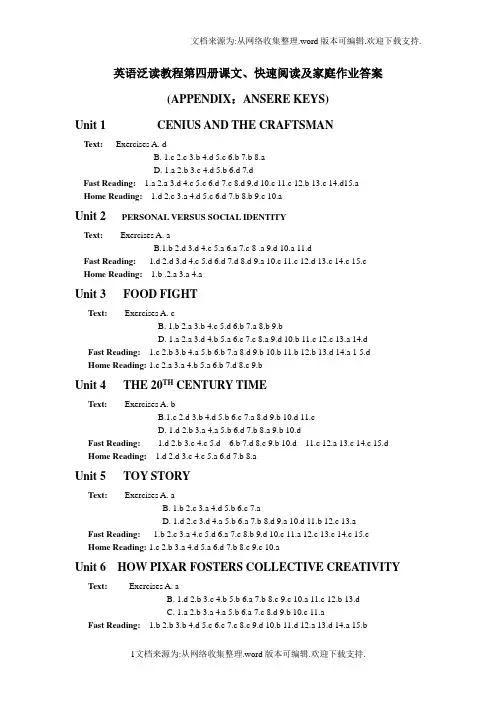
英语泛读教程第四册课文、快速阅读及家庭作业答案(APPENDIX:ANSERE KEYS)Unit 1 CENIUS AND THE CRAFTSMANText:Exercises A. dB. 1.c 2.c 3.b 4.d 5.c 6.b 7.b 8.aD. 1.a 2.b 3.c 4.d 5.b 6.d 7.dFast Reading: 1.a 2.a 3.d 4.c 5.c 6.d 7.c 8.d 9.d 10.c 11.c 12.b 13.c 14.d15.aHome Reading: 1.d 2.c 3.a 4.d 5.c 6.d 7.b 8.b 9.c 10.aUnit 2 PERSONAL VERSUS SOCIAL IDENTITYText:Exercises A. aB.1.b 2.d 3.d 4.c 5.a 6.a 7.c 8 .a 9.d 10.a 11.dFast Reading: 1.d 2.d 3.d 4.c 5.d 6.d 7.d 8.d 9.a 10.c 11.c 12.d 13.c 14.c 15.cHome Reading: 1.b .2.a 3.a 4.aUnit 3 FOOD FIGHTText: Exercises A. cB. 1.b 2.a 3.b 4.c 5.d 6.b 7.a 8.b 9.bD. 1.a 2.a 3.d 4.b 5.a 6.c 7.c 8.a 9.d 10.b 11.c 12.c 13.a 14.dFast Reading: 1.c 2.b 3.b 4.a 5.b 6.b 7.a 8.d 9.b 10.b 11.b 12.b 13.d 14.a 1 5.dHome Reading: 1.c 2.a 3.a 4.b 5.a 6.b 7.d 8.c 9.bUnit 4 THE 20TH CENTURY TIMEText: Exercises A. bB.1.c 2.d 3.b 4.d 5.b 6.c 7.a 8.d 9.b 10.d 11.cD. 1.d 2.b 3.a 4.a 5.b 6.d 7.b 8.a 9.b 10.dFast Reading: 1.d 2.b 3.c 4.c 5.d 6.b 7.d 8.c 9.b 10.d 11.c 12.a 13.c 14.c 15.d Home Reading: 1.d 2.d 3.c 4.c 5.a 6.d 7.b 8.aUnit 5 TOY STORYText: Exercises A. aB. 1.b 2.c 3.a 4.d 5.b 6.c 7.aD. 1.d 2.c 3.d 4.a 5.b 6.a 7.b 8.d 9.a 10.d 11.b 12.c 13.aFast Reading: 1.b 2.c 3.a 4.c 5.d 6.a 7.c 8.b 9.d 10.c 11.a 12.c 13.c 14.c 15.cHome Reading: 1.c 2.b 3.a 4.d 5.a 6.d 7.b 8.c 9.c 10.aUnit 6 HOW PIXAR FOSTERS COLLECTIVE CREATIVITYText: Exercises A. aB. 1.d 2.b 3.c 4.b 5.b 6.a 7.b 8.c 9.c 10.a 11.c 12.b 13.dC. 1.a 2.b 3.a 4.a 5.b 6.a 7.c 8.d 9.b 10.c 11.aFast Reading: 1.b 2.b 3.b 4.d 5.c 6.c 7.c 8.c 9.d 10.b 11.d 12.a 13.d 14.a 15.bHome Reading: 1.b 2.c 3.b 4.d 5.b 6.b 7.b 8.d 9.cUnit 7 POSTMORTEM WITH STRINGSText: Exercises A. cB. 1.c 2.a 3.a 4.b 5.d 6.a 7.b 8.cD. 1.a 2.d 3.c 4.d 5.a 6.a 7.b 8.b 9.c 10.d 11.a 12.b 13.cFast Reading: 1.a 2.d 3.c 4.b 5.a 6.d 7.b 8.d 9.c 10.b 11.d 12.b 13.b 14.c 15.dHome Reading: 1.d 2.d 3.b 4.d 5.c 6.a 7.b 8.a 9.b 10.cUnit 8 THE LIFE OF SAMUEL JOHNSONText: Exercises c.B. 1.d 2. c 3.b 4.b 5 a. 6. c 7.a 8.cD. 1. c2.d 3.a 4. c 5. a 6. b 7. d 8. c 9. b 10.b 11.d 12.d 13.d 14.c 15.dFast Reading: 1.a 2.c 3. a 4. a 5. d 6. b 7c . 8. d 9. d 10. c 11.d 12. d 13. d 14.c 15.d Home Reading: 1.a 2. d 3. d 4.d 5.b 6.c 7.d 8. bUnit 9 THE ARCHAEOLOGISTS WHO WOULDN’T DIGText: Exercises A. bB. 1.b 2.a 3.d 4.c 5.d 6.a 7.b 8.cD. 1.a 2.c 3.b 4.a 5.c 6.d 7.a 8.b 9.c 10.a 11.c 12.a 13.b 14.c 15.a 16.c17.d 18.b 19.aFast Reading: 1.a 2.ac3.c 4.d 5.b 6.a 7.b 8.c 9.c 10.d 11.c 12.b 13.c 14.a 15.dHome Reading: 1.b 2.c 3.d 4.a 5.c 6.b 7.d 8.a 9.d 10.dUnit 10 IS WEATHER GETTING WORSE?Text: Exercises A. cB. 1.c 2.b 3.b 4.c 5.b 6.c 7.b 8.b 9.c 10.cD. 1.b 2.a 3.c 4.b 5.a 6.d 7.d 8.a 9.c 10.a 11.c 12.b 13.b 14.aFast Reading: 1.a 2.b 3.b 4.d 5.a 6.c 7.b 8.b 9.d 10.a 11.d 12.c 13.d 14.d 15.bHome Reading: 1.c2.c 3.c4.a 5.d 6.b 7.d 8.d 9.b 10.cUnit 11 PERSONAL NAMESText: Exercises A. bB. 1.b 2.a 3.a 4.c 5.d 6.c 7.b 8.cD. 1.d 2.a 3.a 4.d 5.b 6.c 7.b 8.a 9.c 10.aFast Reading: 1.c 2.a 3.b 4.d 5.d 6.a 7.c 8.c 9.d 10.a 11.c 12.c 13.d 14.d 15.bHome Reading: 1.c 2.a 3.c 4.a 5.d 6.b 7.a 8.b 9.a 10.cUnit 12 WHY PEOPLE WORKText: Excises A. bB. 1.d 2.a 3.b 4.d 5.d 6.b 7.c 8.d 9.cD. 1.b 2.a 3.a 4.b 5.b 6.c 7.a 8.b 9.c 10.b 11.b 12.a 13.c 14.b 15.aFast Reading: 1.d 2.d 3.b 4.b 5.b 6.d 7.d 8.c 9.b 10.c 11.c 12.b 13.c 14.d 15.aHome Reading: 1.d 2.c 3.c 4.b 5.d 6.b 7.cUnit 13 THE HAPPINESSText: Exercises bB. 1.a 2.b3.b 4.d5.c 6.a 7. c 8.c 9.cD. 1.a 2.b 3.b 4.a 5.b 6.d 7.a 8.c 9. c10.c 11. d 12. b 13.d 14.aFast Reading: 1.d 2.a 3.d 4.d5.d 6.c 7.b 8.c 9.a 10.a 11.c 12.b 13.b 14.d 15.d Home Reading: 1.b 2.c 3.d 4.c 5.c 6.b 7.cd 8.a d.a 10.b 11.dUnit 14 THE AMERICAN SCHOLARText: Exercises cB. 1c. 2.d 3.b 4.b 5.d 6.d 7.c 8.d 9.d 10.dD. 1.c. 2.d 3.b 4.a 5. d 6.d 7.a 8. a 9.b 10.a 11.c 12.a 13.a 14.dFast Reading: 1.a 2.c 3.b 4. a 5.d 6.d 7. d 8.b 9.c 10. c 11.d 12.b 13.c 14. d15.b Home Reading: 1. c2. c 3. c 4. a 5.a 6. c 7.c 8.dUnit 15 THE CHRYSANTHEMUMSText: Exercises A. bB. 1.a 2.d 3.c 4.c 5.a 6.c 7.d 8.b 9.bD. 1.a 2.b 3.c 4.c 5.a 6.b 7.a 8.a 9.d 10.bFast Reading: 1.a 2.c 3.d 4.b 5.a 6.b 7.c 8.c 9.d 10.c 11.c 12.b 13.a 14.d 15.d Home Reading: 1.a 2.c 3.d 4.b 5.c 6.d 7.d 8.b 9.c。
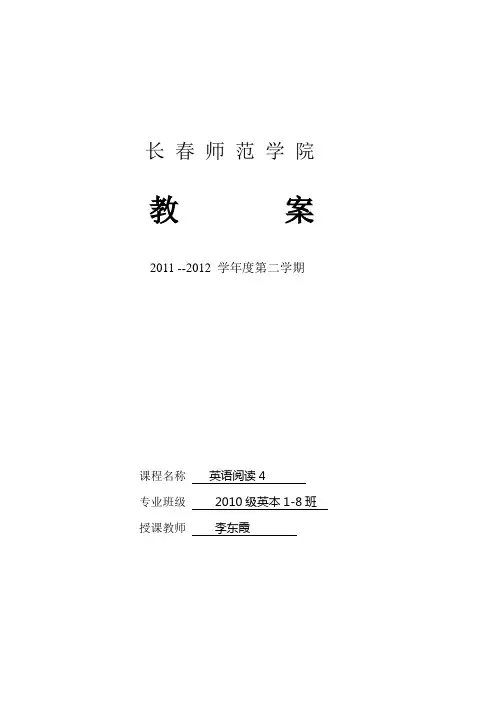
长春师范学院教案2011 --2012 学年度第二学期课程名称英语阅读4专业班级2010级英本1-8班授课教师李东霞本课程教学总体安排课程名称:英语阅读4课程性质与类型:专业必修课总学时﹑学分: 36学时;2学分教学目的与要求:本课程旨在提高学生的英语阅读能力,扩大词汇量,并且掌握基本的阅读技巧。
在此基础上,拓宽学生的视野,培养学生快速准确的获取信息,并且正确的辨别信息的能力;培养学生独立思考,总结文章的中心思想,重点训练学生见“树”亦见“林”的能力。
教材及参考书目:教材:虞苏美黄源深《英语泛读教程4》(第二版)高教版参考书目:1.《朗文当代高级英语词典》商务印书馆2.《金山词霸》Internet3.Jean Zukowski/Faust Susan S.Johnston 《字里行间》《语境阅读》外研社考核方式及成绩计算:考核方式:平时成绩(课堂表现+作业+出勤)+闭卷书面考试成绩计算方法:平时成绩*20%+闭卷书面考试*80%课程教学日历第 1 章教学安排的说明章节题目:Unit 1学时分配:共2学时Text Genius and the Craftsman(1.5 学时)Fast Reading(0.5学时)本章教学目的和要求:To make the Students know the language of the text.1.To make the students know the content of the text.2.To let the students have a discussion on what the text is about.3.To remind the students of rhetoric knowledge and structure of the text. 其它:根据学生的认知程度及时调整教学进度课程教学方案课程名称、授课时数:Unit 1:Text & Fast Reading; 2 hours授课类型:理论课和习题课教学方法与手段:启发式讲授和讨论指导教学目的和要求:1. To make the Students know the language of the text.2. To make the students know the content of the text.3. To let the students have a discussion on what the text is about.4. To remind the students of rhetoric knowledge and structure of the text.教学重点难点:★对Text的理解及对文章的结构教学内容及组织安排:Unit 1: Genius and the CraftsmanI t is to know the process of conceiving a story and developing it into aperfect work of art.About two periods of class will be used for the analysis and discussion of the passage itself.Many people admire writers for their exquisite stories, but few of them know with what painstaking efforts writers work to bring a story into the word. The following passage discusses the process of writing a story in terms of genius and craftsman.1. Robert FrostRobert Frost was born on March 26, 1874 in San Francisco and died on January 29, 1963 in Boston. Frost was an American poet and poet-in- residence at a number of colleges and universities. He was best known for his use of colloquial language, familiar rhythms, and symbols taken from common life to express the quiet values of New England life.His major works include the books of poems A Boy's Will (1913), North of Boston (1914), Mountain Interval (1916) New Hampshire (1923), Steeple Bush (1947), In the Clearing (1962), just mention a few. He also wrote verse Plays, such as A Masque of Reason (1945), and A Masque of Mercy (1947), etc.2. sputnika Russian word, man-made satellite launched by the former Soviet Union.Preview Questions(1) What do you think the meaning of “genius” is?(2) What does a person do to be a genius?(3) Where does genius come from?(4) What do you think the meaning of “craftsman” is?(5) What does a person do to be a craftsman?(6) What relation do you think it is between “genius” and “craftsman”?ⅣEmphasized PointsK ey Words(1)genius(2)craftsman and craftsmanship(3)the creative function(4)conception in the dark of the mind(5)the lucid impression(6)a process of intelligent selection(7)to trust and write(8)rewritingL anguage Notes1. So it is with the reader who comes upon an outstanding story: spellbound, he takes it to his heart, no question asked. (当读者读到一部杰出的小说时,他也会这样如痴如狂,欲将小说字字句句刻骨铭心,绝不会提出任何问题。
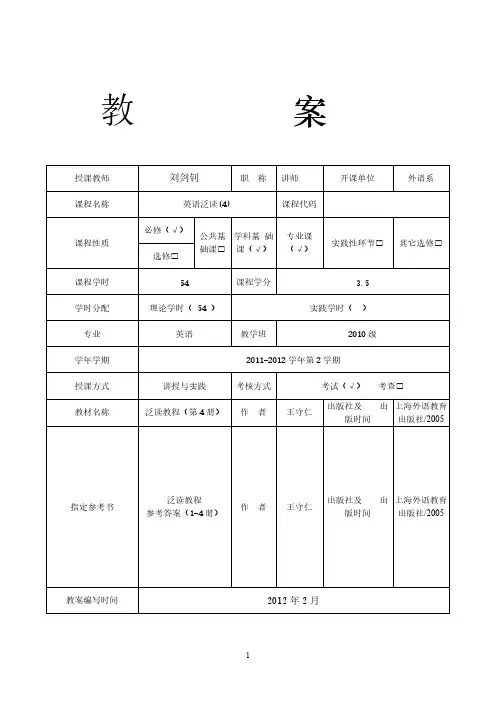
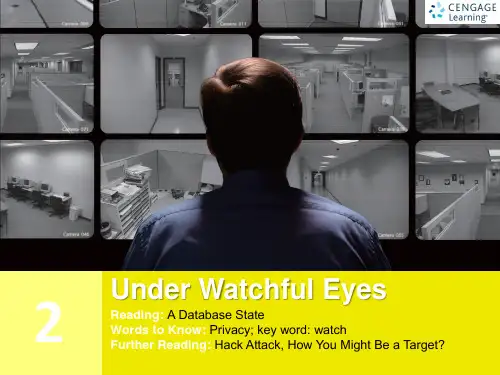
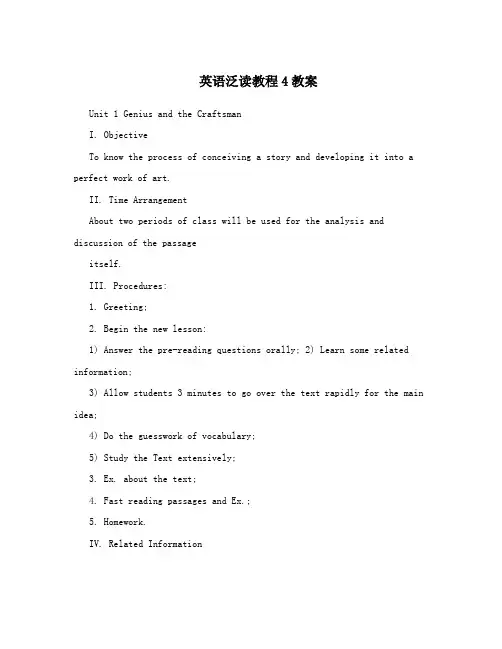
英语泛读教程4教案Unit 1 Genius and the CraftsmanI. ObjectiveTo know the process of conceiving a story and developing it into a perfect work of art.II. Time ArrangementAbout two periods of class will be used for the analysis and discussion of the passageitself.III. Procedures:1. Greeting;2. Begin the new lesson:1) Answer the pre-reading questions orally; 2) Learn some related information;3) Allow students 3 minutes to go over the text rapidly for the main idea;4) Do the guesswork of vocabulary;5) Study the Text extensively;3. Ex. about the text;4. Fast reading passages and Ex.;5. Homework.IV. Related InformationMany people admire writers for their exquisite stories, but few of them know withwhat painstaking efforts writers work to bring a story into the word. The followingpassage discusses the process of writing a story in terms of genius and craftsman.Preview Questions(1) What do you think the meaning of ―genius‖ is?(2) What does a person do to be a genius?(3) Where does genius come from?(4) What do you think the meaning of ―craftsman‖ is?(5) What does a person do to be a craftsman?(6) What relation do you think it is between ―genius‖ and―craftsman‖?V. Emphasized PointsKey Words(1) genius(2) craftsman and craftsmanship(3) the creative function(4) conception in the dark of the mind(5) the lucid impression(6) a process of intelligent selection(7) to trust and write(8) rewriting1VI. Text Comprehension1. Structure AnalysisDivision Paragraph Main IdeaThe firstPart I three An introduction to the topic.paragraphs(1) The necessity of understanding the creative function; The restof Part II (2) the process of conceiving a story; (3) the process of passage developing a story into a perfect work of art.2. Comprehension Questions(1) Why does the writer think it necessary to the creative function?-- The writer believes that understanding of the creative function increases ourwisdom in dealing with the emerging story by making us aware of two things:genius and craftsman or craftsmanship.(2) How is a story conceived?-- A story is conceived when some experience of the present provokes thecombination of one‘s early impressions.(3) What is the principle of a story‘s life?-- Like any seed, the seed of a story has its own principle of growth: a) a processof intelligent selection, b) rarely presents itself as a whole.(4) What are the three functions of the craftsman?-- Trust, write, and generating skill.Topic for Discussion, Is it possible for a writer to start writing on impulse and then catch some good ideas flashing into his mind during the process of writing? Cite examples to illustrate your point., Do you think it is true a good story is not written but rewritten? Why or why not? 3. Teaching Points for Reference(1). So it is with the reader who comes upon an outstanding story: spellbound, he takes it to his heart, no question asked.(当读者读到一部杰出的小说时,他也会这样如痴如狂,欲将小说字字句句刻骨铭心,绝不会提出任何问题。
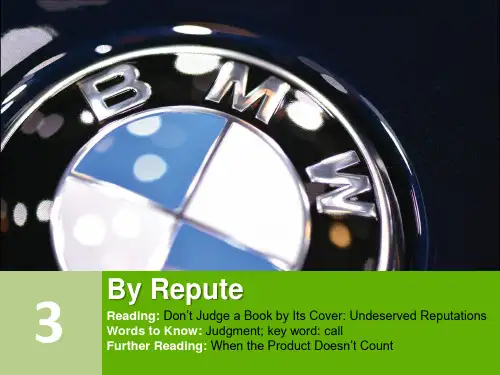
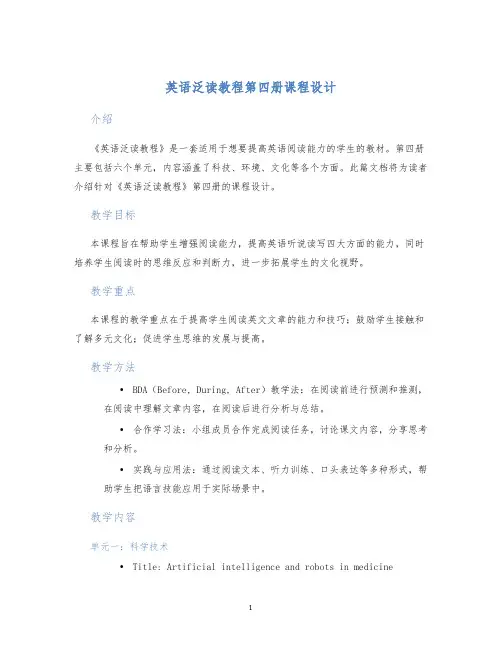
英语泛读教程第四册课程设计介绍《英语泛读教程》是一套适用于想要提高英语阅读能力的学生的教材。
第四册主要包括六个单元,内容涵盖了科技、环境、文化等各个方面。
此篇文档将为读者介绍针对《英语泛读教程》第四册的课程设计。
教学目标本课程旨在帮助学生增强阅读能力,提高英语听说读写四大方面的能力,同时培养学生阅读时的思维反应和判断力,进一步拓展学生的文化视野。
教学重点本课程的教学重点在于提高学生阅读英文文章的能力和技巧;鼓励学生接触和了解多元文化;促进学生思维的发展与提高。
教学方法•BDA(Before, During, After)教学法:在阅读前进行预测和推测,在阅读中理解文章内容,在阅读后进行分析与总结。
•合作学习法:小组成员合作完成阅读任务,讨论课文内容,分享思考和分析。
•实践与应用法:通过阅读文本、听力训练、口头表达等多种形式,帮助学生把语言技能应用于实际场景中。
教学内容单元一:科学技术•Title: Artificial intelligence and robots in medicine•Vocabulary: artificial intelligence, machine learning, robotics, diagnosis, treatment•Reading skills: scanning, skimming, inference•Discussion questions:–What is artificial intelligence?–How can robots be used in medicine?–What are the potential advantages of using robots in medicine?单元二:社会科学•Title: World hunger: causes and solutions•Vocabulary: famine, starvation, poverty, malnutrition, charity, d•Reading skills: prediction, mn idea and supporting detls, cause and effect•Discussion questions:–What is the cause of world hunger?–What can be done to help reduce world hunger?–What can individuals do to help reduce world hunger? 单元三:文化历史•Title: The history of the English language•Vocabulary: etymology, Old English, Middle English, Modern English, dialect, pronunciation•Reading skills: inference, summarize, focus on detls•Discussion questions:–How has the English language evolved over time?–What are the differences between Old English, Middle English and Modern English?–How do regional dialects differ in English?单元四:环境保护•Title: The effects of climate change on global ecosystems•Vocabulary: climate change, global warming, biodiversity, habitat, conservation•Reading skills: skimming, scanning, cause and effect•Discussion questions:–What is climate change and what causes it?–How does climate change affect ecosystems?–What can individuals do to help prevent further climate change?单元五:艺术人文•Title: The importance of music in culture•Vocabulary: genre, composition, lyrics, rhythm, melody•Reading skills: mn idea and supporting detls, inference•Discussion questions:–What is the power of music in our dly lives?–How does music reflect culture?–What are the different types of music in the world? 单元六:商务经济•Title: The impact of e-commerce on traditional businesses•Vocabulary: e-commerce, consumerism, globalization, brick-and-mortar, online marketing•Reading skills: inference, cause and effect, focus on detls•Discussion questions:–What is e-commerce?–What effects are e-commerce having on traditional businesses?–Can traditional businesses compete with e-commerce?结论本课程设计的目标在于帮助学生提高英语阅读能力,同时能培养学生综合运用语言技能的能力,如口头表达和写作。
英语泛读教程第四册教学设计1. 选用课文选择适合学生年级的课文非常重要,本次教学设计使用《The Great Gatsby》中的第一章作为教学材料。
该课文易于理解,内容也饱含了美国文化中的现实主义和浪漫主义元素,适合学生进行泛读。
2. 教学目标语言能力目标1.学会理解课文中难度较大的单词和词组;2.学会阅读长篇英语文学作品并进行泛读;3.学会简要概括和总结阅读内容;4.学会使用正确的语音、发音和语调。
文化认知目标1.了解印象派画作和文学中的现实主义和浪漫主义元素;2.了解美国20世纪初的历史和社会背景。
3. 教学方法本教学将采用以学生为中心的教学方法,通过让学生自主阅读和讨论,从而激发学生的阅读兴趣和提高口语表达能力。
4. 教学流程4.1 情境导入让学生看一张《The Great Gatsby》小说的封面和一幅印象派画作,引导学生回顾先前学过的现实主义和浪漫主义的元素和美国文化过程中的思想倾向。
4.2 阅读和理解给学生一个阅读任务,让他们自主阅读第一章,让他们圈出不熟悉的单词和词组,这些单词和词组在随后的课堂中会进行集中探究和讨论。
同时,要求学生简要概括本章内容,发现作者传达的思想和主旨,并分享和讨论。
4.3 集体阅读和解析安排小组课堂,每个小组分析并总结塞岛·范·埃克的《The Great Gatsby》的第一章,并简要总结一下他所说的内容和风格。
安排每个小组分享他们的发现,以及他们在分析过程中的理解和心得体会。
4.4 细节解析学生共同讨论和分析文章中的重点单词和词组。
在这里,老师将指导学生发现每个单词和词组的隐含含义,帮助他们理解作者的意图和文化背景,并从中获得更深层次的认识和理解。
4.5 总结和解析安排学生一起总结概括授课的任务,分享他们在本次授课过程中获得的知识和感受,并提出任何有兴趣和困难的问题。
让学生回顾他们的阅读过程,整合他们的理解和体验,以便他们可以更好地应用于泛读和口语表达练习中。
教学目标:1. 提高学生的英语阅读理解能力,培养学生对英语文章的整体把握能力。
2. 培养学生的英语写作能力,提高写作水平。
3. 增强学生的英语口语表达能力,提高实际应用能力。
教学内容:1. Unit 1 Life and Logic2. Unit 2 Secrets to Beauty3. Unit 3 Why Culture Counts4. Unit 4 A Journey to the West教学重点:1. 理解并掌握文章主旨大意,分析文章结构。
2. 熟练运用英语写作技巧,提高写作水平。
3. 提高英语口语表达能力,能够进行简单的日常交流。
教学步骤:一、导入1. 介绍本单元主题,激发学生学习兴趣。
2. 预测学生可能遇到的学习难点,做好针对性指导。
二、课文讲解1. Unit 1 Life and Logica. 阅读课文,理解文章大意。
b. 分析文章结构,总结文章主旨。
c. 学习生词和短语,提高词汇量。
d. 分析文章中的逻辑推理,提高逻辑思维能力。
2. Unit 2 Secrets to Beautya. 阅读课文,理解文章大意。
b. 分析文章结构,总结文章主旨。
c. 学习生词和短语,提高词汇量。
d. 讨论文章中的美容秘诀,提高审美观念。
3. Unit 3 Why Culture Countsa. 阅读课文,理解文章大意。
b. 分析文章结构,总结文章主旨。
c. 学习生词和短语,提高词汇量。
d. 讨论文化对个人和社会的影响,提高文化素养。
4. Unit 4 A Journey to the Westa. 阅读课文,理解文章大意。
b. 分析文章结构,总结文章主旨。
c. 学习生词和短语,提高词汇量。
d. 讨论西游记中的故事情节,提高文学鉴赏能力。
三、写作训练1. 根据所学课文,进行写作训练。
2. 教授写作技巧,提高写作水平。
3. 学生互相批改作文,教师点评。
四、口语练习1. 学生分组进行口语练习,模拟真实场景。